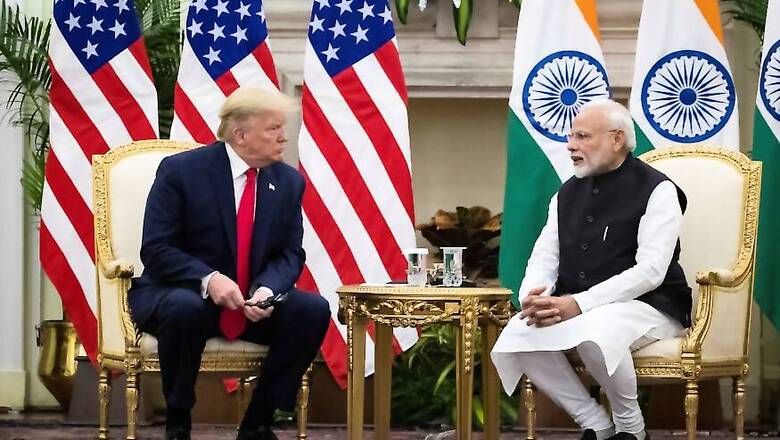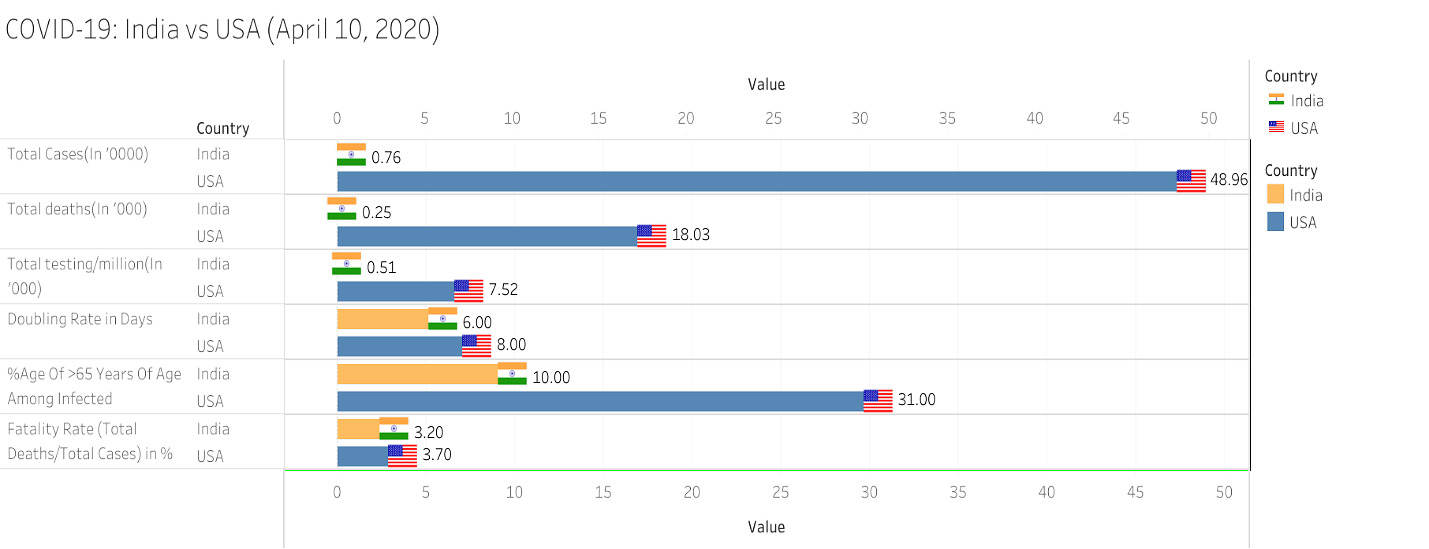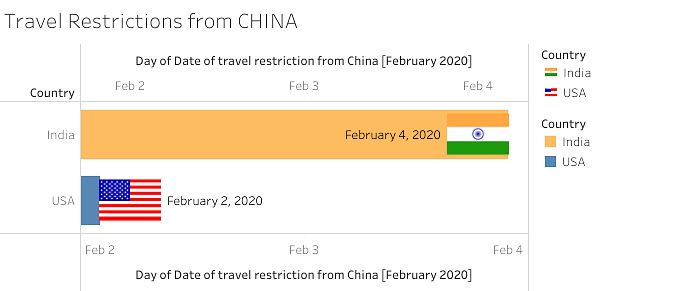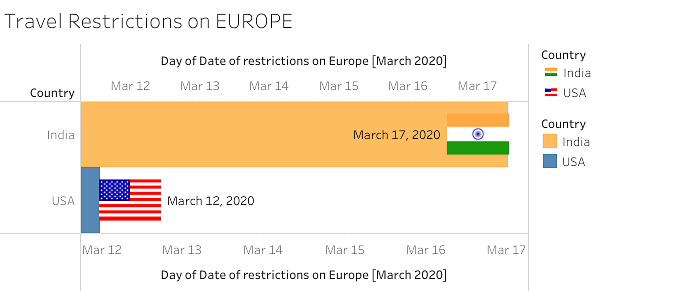
views
When the peripatetic novel coronavirus knocked on American shores, it afforded USA an excludable luxury in the time of any pandemic- the luxury of hindsight. The virus had manifested its biological character and course in China, and its genome had been mapped. All knew it was unfamiliar, had no known treatment or therapeutic prevention. Only non-pharmacological interventions like quarantine, isolation and physical distancing helped in arresting its spread. Yet USA went on to become the epicenter of pandemic and suffered the highest death toll in a short span of time. On April 10, it had 30% of confirmed cases and 18% of COVID-19 deaths in the world.
Being the superpower, there was no dearth of intent, expertise or dollars to fight the pandemic. First confirmed case of COVID-19 in US was detected on Jan 21 in Washington state. India, a lower middle-income country, saw her first case on January 30, 2020. India with almost 430 percent of US population and just 14% of US GDP saw far fewer infections and deaths. There are several learnings here, which are reciprocal and of mutual benefit. However, there is a major caveat to this analysis. The USA also experiences a significantly higher air traffic than India and containment would have always been hard comparably.
The reasons are as much cultural as these are political.
Let’s have a quick look at comparative charts for the two nations.

Fig 1: Demographic and Economic comparison between India and USA (Source: Author)



Fig 2: COVID-19 Statistics: Comparison between India and USA (Source: Author)
Learnings from USA
Personal Freedoms vs Public Good
The first amendment is sanctimoniously revered. Politicians are mortally afraid to do anything that can be seen to encroach on people’s rights. People’s individual freedoms are seen to be paramount and this makes necessary restrictions on public activities difficult.
But extraordinary times require extraordinary responses. Before this was realised, there were thousands of avoidable infections and deaths in the community.
Socialism Needs an Unbiased Rethink
USA has one of the strongest social security nets among the countries. The delivery of benefits is almost par réflexe. Yet, here, socialism is a four-letter word.
The health care system is largely private. This makes coordination among different hospitals and public health officials more challenging than a nationalized health care system like many countries in western Europe. Any well-meaning reform is seen as socialist and is vehemently opposed. Enactment of Obamacare aka Affordable Care Act was a case in point. [Affordable Care Act opponents spent an unprecedented amount of money to convince large segments of the US public of the law’s demerits, outspending supporters by about 15 to one- (The United States Health System in Transition John E. McDonough, Harvard)]
Profit motive in health care industry afforded little redundancy for dealing with crises of such nature. Consequently, poor Blacks and Hispanics, compellingly out of the medical insurance net, and constrained to work through the crisis are being disproportionately affected by disease and death.
Over the last 40 years wages have stagnated in real terms while the price of college has risen eight times as fast and the price of health insurance has also outpaced earnings. (The Guardian)
According to Bloomberg.com, top 1% of US rich earn 21% of total income.

Fig 3: Gini Coefficient, India and USA (Source: Author), 0 means perfect equality; 1 perfect inequality
USA has much more unequal distribution of income in population than India.
There have been periodic movements demanding a balance like Occupy Movement. COVID-19 is anticipated to infuse rigor and vitality to such movements.
Many positive steps are already taken like President Donald Trump has already put a freeze on interest for federal student loans, while New York Governor Andrew Cuomo has paused all medical and student debt owed to New York State. Democrats and Republicans are discussing suspending collection on—or outright canceling—student loans as part of a larger economic stimulus package. These might sustain as historically while it is easy to ratchet state spending up, it is much harder to push it down.
Disjointed Federal and State Response
CDC had significant initial problems in designing and rolling out COVID-19 testing, which made it far harder to gauge the scope of the outbreak.
New York Mayor and Governor could not reach consensus on critical timelines of closure of schools and businesses, allowing free reign to pandemic and overwhelming the health facilities.
Texas Governor has delegated decision to counties- to each its own. There is no common national response for containment. This shall allow virus to leak through these porosities, and full containment is likely to be prolonged.
Alienation of Friends and Allies
“The way I had it figured, Toruk is the baddest cat in the sky. Nothing attacks him. So why would he ever look up?” - Jake Sully, James Cameron’s Avatar
In the movie Avatar, Toruk, a fantastical bird- the apical aerial predator- being naturally selected to not fear any dangers from above, refused to look up; and was thus tamed. We may readily draw comparisons to current geo-political stance of US.
USA’s geo-political hubris was palpable. US has lost favour with Europe. And equally apparent is China’s political model clearly based on an authoritarian régime intent on strengthening a deeply illiberal surveillance state at home while also exporting – or at least trying to popularize – its political and economic development model abroad. (More here)
The last few years, it is safe to say, American relationship with many traditional allies has weakened. This makes it harder for the western world to coordinate its response. Allies of US are able to deal with China with more leverage and are preferring to do so.
Learnings from India
Former Goldman Sachs chief economist Jim O’Neill who said “Thank God this didn’t start in somewhere like India, because there’s absolutely no way that the quality of Indian governance could move to react in the way that the Chinese have done” might be desperate to find a place to hide, given how effectively and quickly India moved to contain the pandemic. It is very early to celebrate any success over the pandemic, but the fact our efforts have been in the correct direction is borne out by relatively smaller number of cases and deaths despite a mammoth and concentrated population.
Central and strong leadership: As the historian John M. Barry wrote in his 2004 book The Great Influenza on the 1918 flu pandemic—the main lesson from that catastrophe is that “those in authority must retain the public’s trust” and “the way to do that is to distort nothing, to put the best face on nothing, to try to manipulate no one.” Prime minister of India sensed the gravity of the situation early and was prompt to seek trust of the country men on mandatory harsh measures necessary to save lives.
Early lockdown at national level pre-empted the pandemic. Currently the Indian nation stands united irrespective of political affiliations at state levels.
District level grass root efforts of pandemic suppression are an ode to strong grass roots Indian bureaucracy which activates synchronously during a crisis. It acts swiftly and with single minded purpose. Public servants here are permanent and thus carry institutional memory while having their fingers on the pulse of the local people.
Nothing gives me more pride than bureaucrats at all levels engaging directly with people, their mellow demeanors hiding firm resolve and formidable intelligence in dealing with the pandemic.
Their efforts are bearing good results.
Disaster preparedness: India’s repeated tryst with natural disasters has helped us to perfect a response system where hundreds and thousands of health and other grass roots workers are mobilized swiftly. The acts and rules under disasters are historically tested, effective and free from political influence. Such freedom to take spot decisions and act idiosyncratically to unique ground situations is strength of Indian system of governance. Bill Gates presciently said US and Europe were not well prepared for fighting a sudden pandemic and need to learn from India.
Opportune Time for Natural Allies to Come Together
The USA and India share liberal and democratic ethos. India is neither willing nor capable of subterfuge unlike China. The platforms for collaboration are infinite and encompass economy, politics, institutions, culture and any combination thereof. Two immediate gravy trains are Biotechnology (Biotech) and Information Technology (IT).
Biotech
India was generous in supply of Hydroxychloroquine while China threatened to stop supply of antibiotics to US.
India is the largest supplier of quality vaccines to the world. It has state of the art vaccine production facilities which can be readily repurposed to produce COVID-19 vaccine, when launched, in bulk and at hugely competitive prices for global supply.
Similarly, India’s cost advantage and technical wherewithal in generic pharmacological production shall be a boon to the world for quick and cheap supply of drugs.
IT
World was already transitioning to newer, more efficient, parsimonious and remote modes of doing business, conducting commerce, consumer engagement and organizational & personal interactions owing to the “Fourth Industrial Revolution”.
COVID-19 has only accelerated the pace of transformation. We must acknowledge that new technologies that created entirely new ways of serving existing needs and significantly disrupted dependence on traditional supply chains have mellowed the disruptive effect of pandemic on the globe.
Major shifts were already occurring on demand side, as growing transparency, consumer engagement, and new patterns of consumer behavior (increasingly built upon access to mobile networks and data) forcing companies to adapt the way they design, market, and deliver products and services.
Indian IT skilled workers have sustained innovation in Silicon Valley. Indian CEO’s are most sought after in this area. More intense collaboration is required today to relentlessly and continuously innovate as our economic survival depends on our quick adaptation to disruptive and remote methods of doing business.
The security and strategic danger posed to liberal world order by Chinese hegemony in 5 G technology and Artificial intelligence needs to be effectively countered through this partnership.
Geo-Politics
India can prove to be a formidable political ally for the USA to balance the Chinese flagship foreign policy initiative, the Belt and Road. China's emerging "Balkan Silk Road" will firmly cement its role in Southeast Europe as a leading lender, investor, and commercial partner in the coming years. Middle East Asia comes in the horizon of the initiative as well. India can help advance democratic principles, institutional freedom and rule of law while guarding US strategic interests in the area.
COVID-19, while presenting the world with a dooms-day scenario has also given us an opportunity to pause and rethink. We learn that Nature selects and Nature culls those who are unable to adapt. She is indifferent to how the choice was made, whether due to ignorance or through an act of will. We also take away that economy is but a rental income on human ingenuity and diligence. The third lesson is that Science has to guide, and rationality has to be at forefront in all human endeavors.
The choices presented to us today are baffling and arduous, akin to proverbial choice between devil and the deep see- whether to allow removal of work force due to sequestration or disease and death. The fight between lives and livelihoods was never so fractious. Yet there is a silver lining. After the virus has spoken, we have a chance to rewrite the rules so that untold millions of people at the margins are not so vulnerable again.
India and USA have similar ethos, and both believe in a fair, free and open society, in which weak are protected, and all have an equal voice and opportunity to grow. COVID-19 gives us an opportunity to come together in helping each other and the world to successfully put this crisis behind us and help the world evolve in a more equitable, generous and peaceful place.



















Comments
0 comment